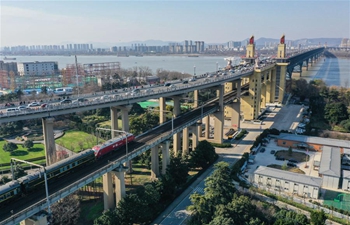BEIJING, Dec. 31 (Xinhua) -- China is set to usher in broader and more intensive reform in 2019 as reform, a policy the country adopted 40 years ago, has become a hallmark of the country.
Starting January 1, a new personal income tax cut will take effect as part of China's tax reform which also involves value-added tax reductions.
These tax cut measures are expected to boost consumers' spending power, optimize income distribution, grow the domestic market, encourage companies to engage in technical upgrading and innovation, and enhance the strength of the Chinese economy to pursue sustained development.
At its bimonthly session last week, China's top legislature, the National People's Congress (NPC) Standing Committee, reviewed a draft foreign investment law and adopted the revised civil servant law as part of the country's efforts to promote its civil service reform.
Li Zhanshu, chairman of the NPC Standing Committee, said about one-third of the subjects covered in this session were closely connected to China's reform, stressing the standing committee's duty in implementing reform and ensuring that all major reform measures are taken in accordance with the law.
As well as the legislature, Chinese people have been passionately advocating reform. A grand exhibition to commemorate the 40th anniversary of China's reform and opening-up, for instance, received over 2.2 million visits within 44 days.
With historical photos, texts, videos, miniature models on display, and interactive activities, the exhibition at the National Museum of China in Beijing has seen the number of daily visits exceeding 60,000 on several days.
A digital version of the exhibition launched about a month ago had been visited nearly 265 million times online as of Dec. 28.
The public enthusiasm about reform and policymakers' resolve to advance reform have mainly come from the country's collective experience of turning China from a poverty-stricken country to the one with growing competitiveness and influence across the world within 40 years.
It is fair to say that China's reform momentum has been particularly strong over the past five years after the Communist Party of China (CPC) decided to advance reform in all aspects at the third plenary session of the 18th CPC Central Committee in 2013.
Since the third plenary session, Chinese President Xi Jinping, also general secretary of the Communist Party of China Central Committee and chairman of the Central Military Commission, has presided over at least 45 high-profile meetings on advancing reforms, during which 400 documents and 1,932 reform plans have been launched, according to official statistics.
As a result, China's reform has been expanded from the economic field to a broad sphere including administrative management, culture, society, ecological conservation, Party building, and the military. And such reform momentum has been unabated.
Despite rising protectionist sentiments overseas, China consistently expands its market to foreign investors through reform measures.
After a pilot run of negative list in Shanghai and later other provinces since 2016, the Chinese government recently announced a negative list for market access nationwide, opening more industries, fields, and businesses to all investors.
The move is to implement the instruction of having the market play a decisive role in resource allocation as instructed by the third plenary session.
A significant institutional breakthrough, as the government noted, is that all market players including state-owned firms, private companies, mixed-ownership enterprises, and foreign firms will be treated equally despite their size or other differences.
According to the Central Economic Work Conference held in December, an annual tone-setting meeting to make arrangements for next year's economic work, the country's reform will be advanced from a long-term perspective to better respond to the concerns of the people and for the good of China and the world at large.
In the financial market, reform measures will be taken to improve the country's monetary policy transmission mechanisms, increase the proportion of direct financing and make financing more accessible and affordable for the private sector and small businesses.
Fair competition will be highlighted in next year's reforms concerning state-owned enterprises, taxation and financing, land, market access, social management, and small and medium enterprises.
Instead of using administrative orders, China will resort to more market-oriented and law-based means to advance the supply-side structural reform, especially when it comes to the downsizing of gutted industries and increasing the vigor of micro market entities.
China is also expected to make more institutional reforms to promote technological innovation and foster new industrial clusters, build a unified and open market system with orderly competition, and prompt the financial sector to better serve the real economy.















